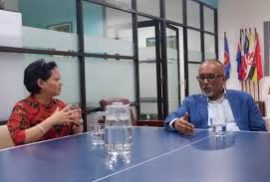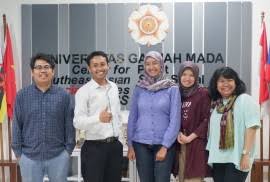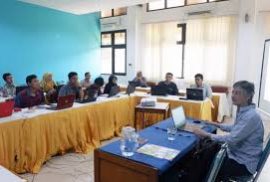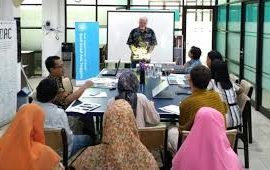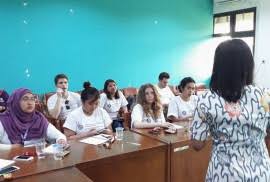Just as the rain stopped, Prof. Cherian George, a professor in the Communication Department in Hong Kong Baptist University, stepped into the office of Centre for Southeast Asian Social Studies (CESASS) Universitas Gadjah Mada (23/11/2017). This visit of a Singaporean Professor in Yogyakarta was as a speaker at the International Seminar on Social and Political Science (ISSOCP) 2017 which is part of the celebration of the 62nd Anniversary of Faculty of Social and Political Sciences (FISIPOL) Universitas Gadjah Mada at University Club UGM on the 23rd-24th November 2017.
Knowledge of all sort should not only be passed from universities to the public, but should too be shared between universities as so to learn from one another in order to enhance the capacity and capability as an institution. As the only leading center of excellence (Pusat Unggulan Ipteks Perguruan Tinggi – PUI-PT) in the aspect of social sciences, Centre of Southeast Asian Social Studies (CESASS) Universitas Gadjah Mada received a visit from a representative of Universitas Negeri Malang (UM), Mr. Arda Purnama Putra, M. Pd. The purpose of his visit to CESASS UGM is to study the management of PUI-PT.
Notwithstanding the constant efforts to tackle Trafficking in Persons, this form of modern slavery is still widespread in Southeast Asia where all the countries in the region are country of origin, destination or both. It is often argued that strategies to combat trafficking have been focusing more on law enforcement and assistance to victims rather than on prevention, hindering the ability of governments to have a significant impact on the issue. In order to eradicate Trafficking in Persons, a more comprehensive approach is needed and prevention strategies should be prioritised.
In the digital era, invasion of fake news and hoax are densely correlated with political interest which has caused uneasiness towards journalist scholars. At this time, the study of investigative journalism becomes suitable to be further discussed in order to asses the ability of the media to criticize in facing fake news and hoax which has spread widely in the media. Such circumstance has caused problem towards journalist activities in this Post-Truth era. Post-Truth era is a phase where the spread of news which seems true, yet it is actually not. In the year 2016, the term Post-Truth became the words of the year by Oxford Dictionary.
Our world has been greatly traumatized by war. The history of modernity has begun since the post-medieval era marked by colonialism and imperialism. Modernization of the concept of war itself was evident during the world war in the early 20th century, till the cold war in the year 1960. The word “war” becomes a specter that terrifies and concerns for it to not reoccur. Unfortunately, the rise of numbers of developed countries comes together with the production of nuclear weapons. With the purpose in maintaining security and sovereignty of their country, nuclear is seen as a solid ford to intimidate their counterpart. The matter that is becoming an alarming issue is the fact that nuclear testing program is taking place in countries beyond the territory of the country that created it, thus bringing upon immense damage towards the people within the host country of the testing program.
The concept of remote sensing is very closely related with sciences, in particularly with the study of Geography and Geology. However, what if remote sensing could be applied to social sciences?
Centre for Southeast Asian Social Studies (CESASS) UGM organised a workshop with the theme “Geographical Information System Application on Social Sciences”, with Prof. Magaly Koch, Ph. D from Center for Remote Sensing, Boston University, United States which was held in the Ruang Indonesia, CESSAS UGM (6/11/2017). This workshop is part of the World Class Professor (WCP) program from the Ministry of Research, Technology and Higher Education of the Republic of Indonesia which was hosted by the consortium of CESASS UGM, Center for Costal Rehabilitation and Disaster Mitigation Studies Universitas Diponegoro and Center for Tsunami and Disaster Mitigation Universitas Syiah Kuala. Prof. Magaly herself is a visiting professor in the Center for Costal Rehabilitation and Disaster Mitigation Studies Universitas Diponegoro.
It is without a doubt that the media has played a significant contribution towards informing issues relating to the environment, from climate change, global warming, to maritime disaster. With this, the communication perspective is needed to explain how communicative action can result in a public sphere that accommodates environmental issues to create a sensitive society.
Center for Southeast Asian Social Studies (CESASS) Universitas Gadjah Mada had another visiting professor which is part of the World Class Professor (WCP) that is sponsored by the Ministry of Research, Technology and Higher Education of the Republic of Indonesia. The third professor to be working with the researcher in CESSAS UGM is Prof. Dr. David Robie from Auckland University of Technology (AUT), New Zealand. He specializes in the aspect of Journalism particularly in environmental issues. Apart from academic, Prof. David is in fact a Greenpeace journalist and activist. He is a living legend for the sunken Rainbow Warrior ship case in pacific. Rainbow Warrior is a Greenpeace ship conducting an anti-nuclear testing protest which was sunken by the French intelligence in the Pacific Ocean.
Corruption is one of the crucial issues faced by many countries in this world, without exception to the countries in the Southeast Asian region. According to the Transparency International in 2016, countries in the Southeast Asian region still have high Corruption Perception Index (CPI) as follows; Cambodia (156), Laos (123), Vietnam (113), Philippines, Thailand and East Timor (101), with Indonesia (90), while Brunei (41), and Malaysia (55) are considered to be satisfactory. Only Singapore (7), is the only country in the Southeast Asian region with the best CPI and is included in the Top 10 globally.
Knowledge on the Southeast Asian region is a crucial topic to be embedded towards Indonesia’s younger generation as early as possible within the formal education system. This matter has become even more important as the ASEAN Economic Community (AEC) has taken place back in 2015. By studying about the Southeast Asian region, it is hoped that the students can have a greater awareness about being part of a nation in the Southeast Asian region, and to introduce them about the ASEAN as an organisation which accommodates countries within this region.
“As a region with a wide territory, relations between the periphery and the center of power in ASEAN are often colored by negative stereotypes due to cultural differences. Surprisingly in the midst of a negative stereotype that developed, the outer areas or often referred to as frontier are still continuously built endlessly for the future hopefuls that unfortunately often cause social and environmental problems ”
The term frontier in the social science universe was originally used by Jackson Turner to explain the American mentality. The term is used to describe the customs of American colonists in exploring and building civilizations in the outer regions found in the new continent. The habit arises because of the view that the outermost is an area full of resources but still underdeveloped. Therefore the area needs to be continuously exploited in order to advance so that it can produce profit for human.

